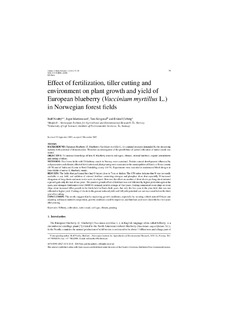Effect of fertilization, tiller cutting and environment on plant growth and yield of European Blueberry (Vaccinium myrtillus L.) in Norwegian forest fields.
Journal article, Peer reviewed
Published version
Permanent lenke
http://hdl.handle.net/11250/2499538Utgivelsesdato
2014Metadata
Vis full innførselSamlinger
- Publikasjoner fra CRIStin - NIBIO [4575]
- Vitenskapelige artikler [1416]
Originalversjon
Nestby, R., Martinussen, I., Krogstad, T., & Uleberg, E. (2014). Effect of fertilization, tiller cutting and environment on plant growth and yield of European blueberry (Vaccinium myrtillus L.) in Norwegian forest fields. Journal of Berry Research, 4(2), 79-95. 10.3233/JBR-140070Sammendrag
BACKGROUND: European blueberry (E. blueberry; Vaccinium myrtillus L.) is a natural resource demanded by the processing industry with potential of domestication. Therefore an investigation of the possibilities of partial cultivation of native stands was started.
OBJECTIVE: To increase knowledge of how E. blueberry react to soil types, climate, mineral nutrition, organic amendments and cutting of tillers.
METHODE: Five forest fields with E.blueberry stands in Norway were examined. Besides natural development influenced by soil parameters and climate, effect of fertilization and plant pruning were examined in the municipalities of Bardu in Troms county (68°N) and of Snåsa and Lierne in Nord-Trøndelag county (64°N). Experiments were executed in randomized block designs in forest fields of native E. blueberry stands.
RESULTS: The fields that performed best had O-layers close to 7 cm or thicker. The C/N ratios indicate that N was not easily available in any field, and addition of mineral fertilizer containing nitrogen and phosphor show that especially N increased elongation of long shoots and more nodes were developed. However, the effect on number of short shoots per long shoot initiated a growth gain only the last of two years. The positive growth effect of fertilizer was not followed by higher yields throughout the years, and strongest fertilization level (N60P40) reduced yield in average of four years. Adding composted wood chips or wood chips alone increased tiller growth in the birch-field in Bardu both years, but only the first year in the pine-field; this was not reflected in higher yield. Cutting of shoots to the ground reduced yield and full yield potential was not recovered before the third year after cutting.
CONCLUSION: The results suggest that by improving growth conditions, especially by securing a thick natural O-layer and adjusting soil macro nutrient composition, growth conditions could be improved; and that fruit yield were down the two first years after pruning.

